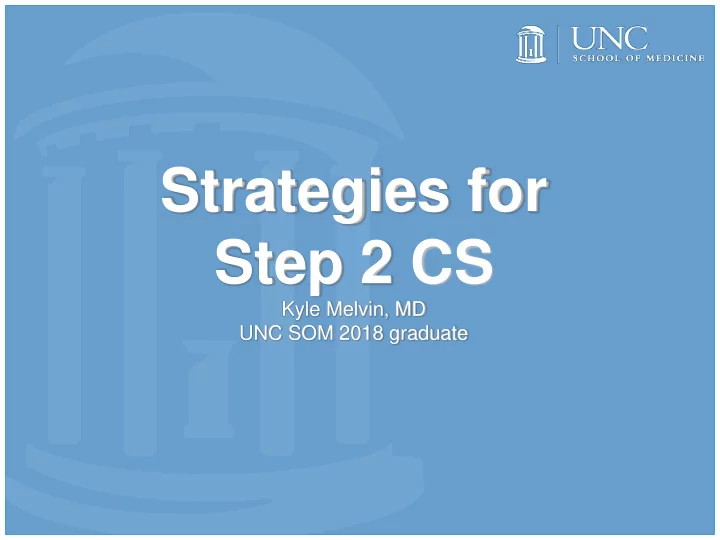

Strategies for Step 2 CS Kyle Melvin, MD UNC SOM 2018 graduate
How Am I Evaluated? • Communication and Interpersonal Skills (CIS) » Interpersonal skills such as eye contact, active listening, showing empathy and the wrap-up portion of the exam • Spoken English Proficiency (SEP) » Pronunciation, word-choice and minimizing the need to repeat questions or statements • Integrated Clinical Encounter (ICE) » History and physical exam as well as diagnostic impressions, justification of the potential diagnoses and initial patient diagnostic studies 2
Common Issues Students Face • Running out of time in the encounter » Only 15 minutes in the room with the patient and 10 minutes outside of the room to write your note • No “game plan” for tackling each encounter » Students see the chief complaint and walk in without thinking about the possible differential diagnoses • Failing to hit every portion of the history and/or physical exam • Poor reviews from SPs on interpersonal skills • Lack of documentation » If you do not document it, it did not happen 3
Managing Time in the Room • 5-7 minutes in order to get the full history » Spend more time on the HPI than anything else but be sure to ask questions regarding the other parts of the history • 3-5 minutes to do a brief physical exam » At a minimum you should do the physical exam that pertains to the chief complaint (i.e., a heart and lung exam for chest pain) » As time permits do your “routine outpatient exam” • 3-5 minutes to wrap up the encounter with the patient » Go over initial diagnostic impression and what you want to do to work the patient up » Ask “do you have any questions or concerns?” » Almost all standardized patients have a “difficult question” for you to answer 4
The Game Plan • Before entering the room create a brief template, including: » All portions of the history (HPI, past medical history, family history and social history) » A section for documentation of your physical exam findings (can also be used as a place to remind you to do a physical exam) » A space for differential diagnoses • Once you see the chief complaint, write down the top 3- 5 most common/don’t miss problems for that chief complaint » Example: Chest pain (ACS, PE, GERD, pneumothorax, aortic dissection) • Can also serve as a template for your documentation 5
Sample Game Plan 6
Dos and Don’ts • Do: » Make a game plan before you go in the room » Think about your differential for the chief complaint • You can always add/subtract diagnoses as the encounter goes along » Document everything you did in the room • Don’t: » Try to be perfect (time is limited in this exam) • Example: It does not matter if you get every detail of the HPI if you get none of the medical, family or social histories » Forget about the patient wrap-up (this is where you get the majority of your CIS points) 7
Recommend
More recommend